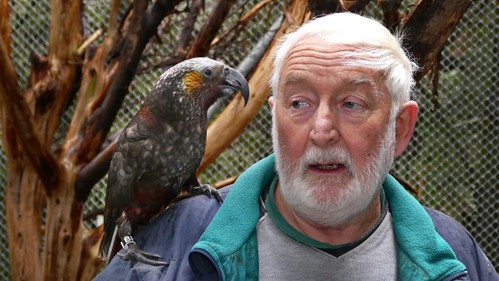 Kaka Casey and Russell Evans at Bush Haven bird sanctuary in Otatara. Image by JOHN HAWKINSWhen Otatara couple Darren and Joanna May spotted a kaka in their yard they took it as reward for all their pest control efforts.
Kaka Casey and Russell Evans at Bush Haven bird sanctuary in Otatara. Image by JOHN HAWKINSWhen Otatara couple Darren and Joanna May spotted a kaka in their yard they took it as reward for all their pest control efforts.
The pair spotted the kaka in a kowhai tree in their backyard in the early hours of Wednesday, September 2.
It was the only kaka they have spotted in the area, May said.
"I do trap lines for the Otatara Landcare group out at Bushy point, so I like to think of it as payback for keeping the pests down."
Joanna spotted the bird in their kowhai tree when she went out to feed their alpacas in the morning, Darren said.
When she told her husband what she had seen, he initially dismissed it, saying that it was probably a wood pigeon, Joanna said.
"I was quite lucky that it stuck around for 10 minutes and I was able to get a couple of good pictures of it."
The pair thought it may have escaped from nearby bird sanctuary Bush Haven but investigations revealed that wasn't the case.
"Hopefully, it's a sign that [the Otatara Landcare Group is] making some progress."
Darren has been involved with the group for about three years, at one point serving on the committee.
They often had kereru and waxeyes visit their property as well as tui and fantails, he said.
"Now I'm intrigued every time I see the tree move, but it's usually just a kereru ," Joanna said.
May Evans and her husband Russell, who run the Bush Haven bird sanctuary in Otatara, said they received a number of calls from the neighbourhood checking if the kaka belonged to them.
The couple looks after a breeding pair of kaka, Casey and Hannah.
While it would be nice to see the kaka, Evans was weary about it coming to their property.
"It could upset our breeding pair."
They suspect the kaka had flown across from Stewart Island. Kereru often flew over from the island so it was possible a kaka could come over as well, Evans said. "They're big birds."
The kaka could stay in Otatara or it might move on, she said.
The efforts of the Otatara Landcare Group, which the Evans are also part of, may have contributed to enticing the kaka to visit, she said.
"Always keeping the pests down might be helping," she said.
Russell Evans said there were still some people in Otatara who were still complacent about the pest problem.
"If we could get everyone in Otatara involved, [the kaka] would bloom here," he said.